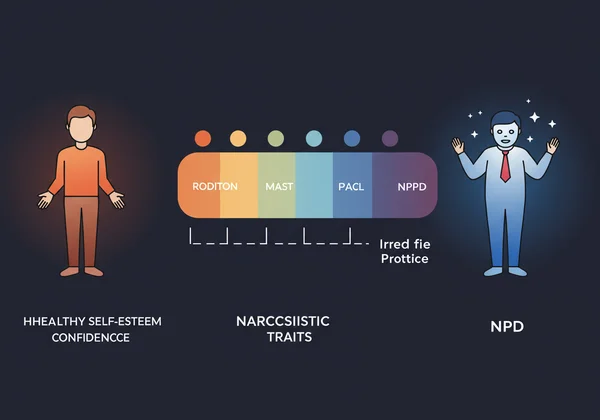आत्ममोह (नार्सिसिज़्म) के कारण क्या हैं? हमारा निःशुल्क आत्ममोह परीक्षण लें
क्या आपने कभी सोचा है कि आत्ममोह के लक्षण कहाँ से आते हैं? यह एक ऐसा प्रश्न है जो मानव मानसिकता की गहराइयों में उतरता है, बचपन, पर्यावरण और यहाँ तक कि हमारी जीव विज्ञान के जटिल ताने-बाने की खोज करता है। इन व्यवहारों के मूल को समझना दोषारोपण के बारे में नहीं है; यह स्वयं को और अपने रिश्तों को बेहतर ढंग से समझने के बारे में है। यदि आपने कभी पूछा है, "मैं कैसे बता सकता हूँ कि मैं नार्सिसिस्ट हूँ?", तो आपने पहले ही अधिक आत्म-जागरूकता की दिशा में पहला कदम उठा लिया है। इन जड़ों की खोज एक सशक्त यात्रा हो सकती है, और एक बढ़िया शुरुआती बिंदु अपने लक्षणों का पता लगाना है।
आत्ममोह (नार्सिसिज़्म) का मनोविज्ञान: मुख्य लक्षणों को समझना
इससे पहले कि हम "क्यों" का पता लगाएं, "क्या" को समझना आवश्यक है। नार्सिसिज़्म एक स्पेक्ट्रम पर मौजूद है। एक छोर पर, हमारे पास स्वस्थ आत्म-विश्वास होता है, लेकिन जैसे-जैसे हम स्पेक्ट्रम पर आगे बढ़ते हैं, हमें अधिकार-भावना, सहानुभूति की कमी और प्रशंसा की अत्यधिक आवश्यकता का बढ़ता हुआ पैटर्न दिखाई देता है। ये लक्षण व्यक्तिगत और व्यावसायिक संबंधों में महत्वपूर्ण चुनौतियाँ पैदा कर सकते हैं। इस आधार को समझने से हमें संभावित कारणों को संदर्भ में रखने में मदद मिलती है।

स्वस्थ आत्म-सम्मान को आत्ममोह के लक्षणों से अलग करना
वास्तविक आत्म-मूल्य और नार्सिसिज़्म के बीच अंतर करना महत्वपूर्ण है। स्वस्थ आत्म-सम्मान मूल्य और क्षमता की आंतरिक भावना में निहित होता है। यह विनम्रता और खामियों को स्वीकार करने की क्षमता की अनुमति देता है। हालांकि, नार्सिसिस्टिक लक्षण अक्सर गहरी असुरक्षा को छिपाते हैं। यह झूठा आत्मविश्वास नाजुक होता है और इसे बनाए रखने के लिए निरंतर बाहरी सत्यापन की आवश्यकता होती है, जिससे चुनौती दिए जाने पर रक्षात्मक प्रतिक्रियाएँ होती हैं।
स्पेक्ट्रम: लक्षणों से लेकर नार्सिसिस्टिक पर्सनालिटी डिसऑर्डर (एनपीडी) तक
अधिकांश लोग कभी-कभी कुछ आत्ममोह के लक्षण प्रदर्शित करते हैं। स्वार्थ का एक क्षण होना या ध्यान का केंद्र बनना किसी को नार्सिसिस्ट नहीं बनाता है। ये व्यवहार तब अधिक चिंताजनक हो जाते हैं जब वे एक लगातार पैटर्न बनाते हैं। नार्सिसिस्टिक पर्सनालिटी डिसऑर्डर (एनपीडी) स्पेक्ट्रम के सबसे दूर के छोर पर एक औपचारिक नैदानिक निदान है, जिसकी विशेषता व्यापक भव्यता और सहानुभूति की अक्षमता है। हमारा लक्ष्य यहाँ निदान करना नहीं है, बल्कि उन लक्षणों को समझना है जो आपको स्पष्टता प्राप्त करने के लिए प्रेरित कर सकते हैं।
बचपन का आघात और आत्ममोह (नार्सिसिज़्म): एक जटिल संबंध
कई मनोवैज्ञानिक सिद्धांत आत्ममोह के लक्षणों के विकास में प्रारंभिक जीवन के अनुभवों को एक महत्वपूर्ण कारक बताते हैं। प्रारंभिक वर्ष वह समय होता है जब हमारी स्वयं की मूल भावना का निर्माण होता है। इस महत्वपूर्ण अवधि के दौरान व्यवधानों का व्यक्तित्व विकास पर स्थायी प्रभाव पड़ सकता है, और बचपन के आघात और आत्ममोह (नार्सिसिज़्म) के बीच का संबंध अध्ययन का एक व्यापक रूप से खोजा गया क्षेत्र है।
प्रारंभिक जुड़ाव की शैलियाँ: क्या असुरक्षा एक नींव है?
अटैचमेंट थ्योरी बताती है कि देखभाल करने वालों के साथ हमारे सबसे शुरुआती बंधन जीवन भर हमारे संबंधपरक पैटर्न को आकार देते हैं। जब किसी बच्चे की सुरक्षा, प्रेम और सत्यापन की ज़रूरतें लगातार पूरी नहीं होती हैं, तो एक असुरक्षित जुड़ाव बन सकता है। यह असुरक्षा एक शून्य पैदा कर सकती है, जो कुछ व्यक्तियों में, एक भव्य, झूठे स्वयं के निर्माण से भर जाती है - एक सुरक्षात्मक खोल जिसे एक ऐसी दुनिया में उनकी योग्यता साबित करने के लिए डिज़ाइन किया गया है जिसे वे अविश्वसनीय या अस्वीकार्य मानते हैं। यह रक्षा तंत्र गहरे भावनात्मक दर्द से निपटने का एक तरीका है।
उपेक्षा, दुर्व्यवहार और अत्यधिक आलोचना का प्रभाव
आघात के अधिक स्पष्ट रूप, जैसे भावनात्मक उपेक्षा, शारीरिक दुर्व्यवहार, या निरंतर आलोचना, बच्चे के विकसित होते अहंकार के लिए विनाशकारी हो सकते हैं। एक बच्चा जिसे लगातार बताया जाता है कि वह पर्याप्त अच्छा नहीं है, एक क्षतिपूरक व्यक्तित्व विकसित कर सकता है। वे हीनता की असहनीय भावनाओं के खिलाफ एक रक्षा के रूप में श्रेष्ठ और त्रुटिहीन होने की एक आंतरिक कथा बना सकते हैं। यह फुलाया हुआ आत्म-छवि आगे की भावनात्मक चोट के खिलाफ एक ढाल बन जाती है।

प्रकृति बनाम पोषण: आत्ममोह के लक्षणों के मूल की खोज
जबकि बचपन का आघात एक सम्मोहक व्याख्या प्रदान करता है, आत्ममोह के लक्षणों की उत्पत्ति की कहानी शायद ही कभी इतनी सरल होती है। यह पर्यावरण कारकों (पोषण) और संभावित जैविक प्रवृत्तियों (प्रकृति) का एक जटिल अंतर्संबंध है। हर कोई जो एक कठिन बचपन का अनुभव करता है, आत्ममोह के लक्षण विकसित नहीं करता है, और कुछ ऐसे भी होते हैं जो जाहिरा तौर पर स्थिर घरों से आते हैं।
अत्यधिक प्रशंसा और यथार्थवादी प्रतिक्रिया की कमी की भूमिका
पालन-पोषण के सिक्के के दूसरे पहलू पर अत्यधिक प्रशंसा है। एक बच्चा जिसकी लगातार विशेष, परिपूर्ण या श्रेष्ठ होने के लिए प्रशंसा की जाती है, बिना किसी यथार्थवादी प्रतिक्रिया या सीमाओं के, अधिकार-भावना को आंतरिक कर सकता है। इसे कभी-कभी "ट्रॉफी" पालन-पोषण के रूप में संदर्भित किया जाता है, जहाँ बच्चे का मूल्य उसकी उपलब्धियों से जुड़ा होता है। वे सीखते हैं कि उनका मूल्य सशर्त है और सर्वश्रेष्ठ होने पर निर्भर करता है, जिससे निरंतर प्रशंसा की आवश्यकता होती है।
आत्ममोही व्यवहारों का सामाजिक और सांस्कृतिक सुदृढीकरण
हम व्यापक संदर्भ को नज़रअंदाज़ नहीं कर सकते। आधुनिक समाज, व्यक्तिवाद, सेलिब्रिटी संस्कृति और सोशल मीडिया सत्यापन पर अपने जोर के साथ, अनजाने में आत्ममोही व्यवहारों को पुरस्कृत कर सकता है। "लाइक्स," फॉलोअर्स और एक पूरी तरह से क्यूरेटेड ऑनलाइन व्यक्तित्व की खोज बाहरी सत्यापन की आवश्यकता को बढ़ावा देती है। जब इन व्यवहारों का जश्न मनाया जाता है, तो यह आत्म-केंद्रितता और वास्तविक संबंध पर सतही दिखावे पर ध्यान केंद्रित करने जैसे लक्षणों को सामान्य और यहां तक कि प्रोत्साहित भी कर सकता है।
आनुवंशिक प्रवृत्तियाँ: क्या आत्ममोह (नार्सिसिज़्म) विरासत में मिलता है?
आनुवंशिक प्रवृत्तियों की भूमिका पर शोध जारी है, लेकिन कुछ अध्ययनों से पता चलता है कि व्यक्तित्व लक्षणों, जिनमें आत्ममोह से जुड़े लक्षण भी शामिल हैं, का एक आनुवंशिक घटक हो सकता है। जन्म से मौजूद कुछ स्वभावगत लक्षण, जैसे उच्च भावनात्मक संवेदनशीलता या आक्रामकता, किसी व्यक्ति को विशिष्ट पर्यावरणीय ट्रिगर्स के साथ मिलकर आत्ममोह के पैटर्न विकसित करने के लिए अधिक संवेदनशील बना सकते हैं। यह प्रकृति के बंदूक लोड करने और पोषण के ट्रिगर खींचने का एक शास्त्रीय मामला है।

गहरी आत्म-जागरूकता के लिए 'क्यों' को समझना
आत्ममोह (नार्सिसिज़्म) की जड़ों की खोज एक अकादमिक अभ्यास नहीं है; यह सहानुभूति और परिवर्तन का एक मार्ग है। चाहे आप अपनी स्वयं की प्रवृत्तियों की जाँच कर रहे हों या अपने जीवन में किसी को समझने की कोशिश कर रहे हों, "क्यों" जानने से निर्णय को करुणा में बदला जा सकता है। यह इन चुनौतीपूर्ण व्यवहारों को अंतर्निहित नैतिक विफलताओं के रूप में नहीं, बल्कि सीखी हुई मुकाबला रणनीतियों के रूप में फिर से परिभाषित करता है जो अब अपने उद्देश्य की पूर्ति नहीं कर रहे हैं।
उत्पत्ति को समझना व्यक्तिगत विकास को कैसे सूचित करता है
जब आप समझते हैं कि आत्ममोह के लक्षण अक्सर दर्द या असुरक्षा से उत्पन्न होते हैं, तो आप केवल लक्षणों के बजाय मूल कारण को संबोधित करना शुरू कर सकते हैं। व्यक्तिगत विकास तब संभव हो जाता है जब आप अंतर्निहित भावनात्मक घावों की पहचान कर सकते हैं। यह जागरूकता स्वस्थ मुकाबला तंत्र विकसित करने, वास्तविक आत्म-सम्मान बनाने और अधिक प्रामाणिक संबंध बनाने की दिशा में पहला कदम है।
जब आत्म-चिंतन स्पष्टता और कार्रवाई की ओर ले जाता है
आत्म-चिंतन एक शक्तिशाली उपकरण है, लेकिन कभी-कभी हमें अपने पैटर्न को अधिक स्पष्ट रूप से देखने के लिए एक संरचित तरीके की आवश्यकता होती है। यहीं पर वस्तुनिष्ठ प्रतिक्रिया अमूल्य हो सकती है। एक अच्छी तरह से डिज़ाइन किया गया मूल्यांकन लेना आपकी यात्रा शुरू करने के लिए आवश्यक प्रारंभिक अंतर्दृष्टि प्रदान कर सकता है। यह आपके व्यवहारों के लिए एक दर्पण प्रदान करता है, जिससे आपको सार्थक परिवर्तन के लिए आवश्यक स्पष्टता और कार्रवाई कदम प्राप्त करने में मदद मिलती है। यदि आप वह कदम उठाने के लिए तैयार हैं, तो एक निःशुल्क आत्ममोह परीक्षण एक उत्कृष्ट संसाधन हो सकता है।

जड़ों को समझना: स्पष्टता और विकास की आपकी राह
आत्ममोह (नार्सिसिज़्म) के कारण बहुआयामी हैं, जो बचपन के अनुभवों, पालन-पोषण की शैलियों, आनुवंशिकी और सांस्कृतिक प्रभावों के धागों को एक साथ जोड़ते हैं। इसका कोई एक उत्तर नहीं है, बल्कि संभावनाओं का एक समृद्ध ताना-बाना है। इन संभावित मूलों को समझना व्यवहार को रहस्यमुक्त करने में मदद करता है, जिससे स्वयं और दूसरों के लिए करुणा को बढ़ावा मिलता है।
अंततः, इन संभावित मूलों को समझना आपको भ्रम से स्पष्टता की ओर बढ़ने में सशक्त बनाता है, स्वस्थ संबंधों और आत्म की अधिक प्रामाणिक भावना की दिशा में पहला कदम उठाता है। यदि इस अन्वेषण ने आपके साथ प्रतिध्वनित किया है, और आप अपनी स्वयं की प्रवृत्तियों के बारे में उत्सुक हैं, तो व्यक्तिगत अंतर्दृष्टि प्राप्त करने और आत्म-खोज की अपनी यात्रा को आगे बढ़ाने के लिए हमारा निःशुल्क आत्ममोह परीक्षण लेने पर विचार करें।
आत्ममोह (नार्सिसिज़्म) की उत्पत्ति और पहचान के बारे में अक्सर पूछे जाने वाले प्रश्न
आत्ममोह के लक्षणों की पहचान और उन्हें समझने के बारे में कुछ सामान्य प्रश्नों के उत्तर यहाँ दिए गए हैं।
किस प्रकार का आघात आत्ममोह (नार्सिसिज़्म) का कारण बनता है?
कोई एक विशिष्ट प्रकार नहीं है। आघात जो आत्ममोह के लक्षणों में योगदान कर सकता है, अक्सर बच्चे के सच्चे स्वयं का गहरा अमान्यकरण शामिल होता है। यह भावनात्मक उपेक्षा और असंगत देखभाल से लेकर अत्यधिक आलोचना तक, या इसके विपरीत, केवल प्रदर्शन के लिए मूल्यवान होने (अत्यधिक प्रशंसा) तक हो सकता है। सामान्य धागा एक ऐसा वातावरण है जहाँ बच्चा सीखता है कि उसका प्रामाणिक स्वयं स्वीकार्य नहीं है, जिससे वह सुरक्षा के लिए एक झूठा, भव्य व्यक्तित्व बनाता है।
मैं कैसे बता सकता हूँ कि मैं आत्ममोही हूँ?
प्राकृतिक अंध बिन्दुओं के कारण आत्म-मूल्यांकन मुश्किल हो सकता है। प्रमुख संकेतकों में प्रशंसा की निरंतर आवश्यकता, दूसरों के लिए सहानुभूति की कमी, अधिकार-भावना और आलोचना को संभालने में कठिनाई शामिल है। सबसे प्रभावी पहला कदम अक्सर आत्म-चिंतन के लिए डिज़ाइन किए गए एक संरचित उपकरण का उपयोग करना होता है। एक ऑनलाइन आत्ममोह व्यक्तित्व परीक्षण आपके व्यवहार पैटर्न और प्रवृत्तियों में वस्तुनिष्ठ अंतर्दृष्टि प्रदान कर सकता है।
क्या आत्ममोह से ग्रस्त व्यक्ति जानते हैं कि वे आत्ममोह से ग्रस्त हैं?
यह बहुत भिन्न होता है। मजबूत आत्ममोह के लक्षणों वाले कुछ व्यक्तियों में जागरूकता के क्षण होते हैं, खासकर विफलता या संबंध विच्छेद की अवधि के दौरान, जहाँ उनकी सावधानीपूर्वक निर्मित आत्म-छवि को खतरा होता है। हालांकि, कई लोगों में अपने व्यवहार को सटीक रूप से देखने के लिए आत्म-जागरूकता की कमी होती है। उन लक्षणों को स्वीकार करना जिन्हें वे "दोषपूर्ण" मानते हैं, उनके नाजुक अहंकार के लिए बहुत खतरनाक हो सकता है, इसलिए वे अक्सर इसके बजाय दूसरों पर दोषारोपण करते हैं।
आत्ममोह (नार्सिसिज़्म) के लिए क्या गलत समझा जा सकता है?
कई स्थितियाँ या लक्षण आत्ममोह (नार्सिसिज़्म) के लिए गलत समझे जा सकते हैं। उच्च आत्म-सम्मान, मुखरता, या महत्वाकांक्षा को कभी-कभी गलत लेबल दिया जा सकता है। इसके अतिरिक्त, ऑटिज्म स्पेक्ट्रम डिसऑर्डर वाले व्यक्ति सामाजिक संकेतों के साथ संघर्ष कर सकते हैं, जिसे सहानुभूति की कमी के रूप में गलत समझा जा सकता है। इसी तरह, जिन लोगों ने आघात का अनुभव किया है, वे रक्षात्मक व्यवहार (जैसे अहंकार या भावनात्मक अलगाव) प्रदर्शित कर सकते हैं जो आत्ममोह के लक्षणों से मिलते-जुलते हो सकते हैं लेकिन विभिन्न अंतर्निहित कारणों से उत्पन्न होते हैं।
अस्वीकरण: यह लेख केवल सूचनात्मक और शैक्षिक उद्देश्यों के लिए है। इस वेबसाइट द्वारा प्रदान किया गया परीक्षण एक नैदानिक उपकरण नहीं है और इसे पेशेवर चिकित्सा या मनोवैज्ञानिक सलाह, निदान या उपचार का विकल्प नहीं माना जाना चाहिए। यदि आपको अपने मानसिक स्वास्थ्य के बारे में चिंता है, तो कृपया एक योग्य स्वास्थ्य सेवा पेशेवर से परामर्श करें।